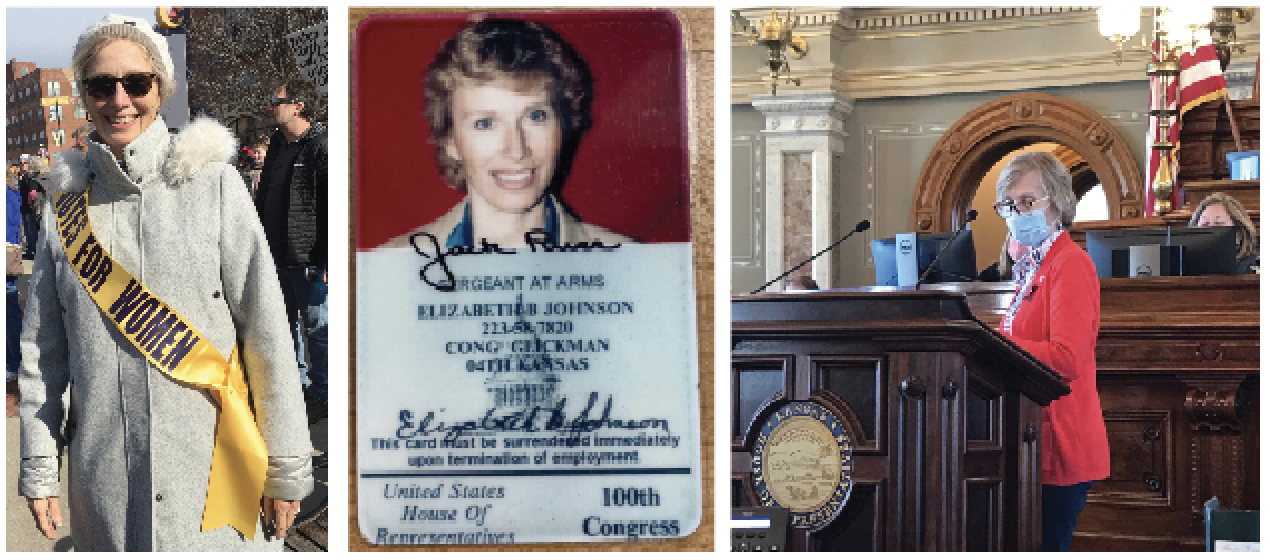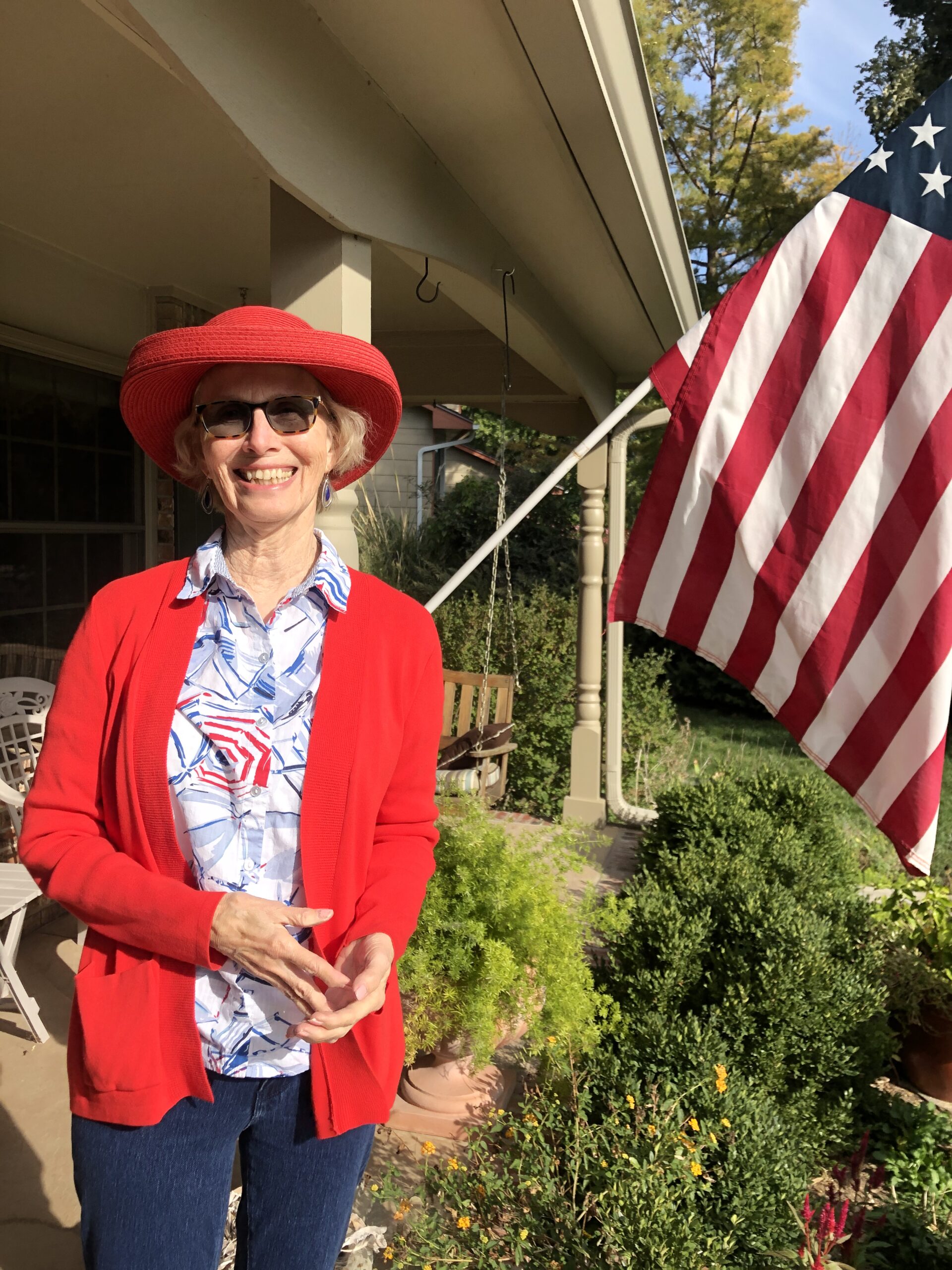
State Rep. Elizabeth Bishop backs fellow female candidates at a political rally earlier this year, left; her badge while working for former U.S. Rep. Dan Glickman during the 100th Congress, 1987-88, middle; and speaking during a session of the Kansas Legislature last year.
It took Elizabeth Bishop a couple tries to get over the electoral hump. But for the second election in a row, she can rest easy.
The state representative from southeast Wichita, who lost her first four races for office, drew no opposition on the Nov. 3 election ballot, something of a rarity for a Democrat in south-central Kansas.
Bishop, who turned 77 in June, will return to Topeka as the oldest member of the Legislature, something that was on her mind as she sat down for an interview last month.
Bishop missed nearly all of last year’s shortened regular legislative session as her husband, Darrel, recovered from heart surgery, although she followed proceedings closely from home. She attended the 24-hour wrap-up session in May as well as a two-day special session in June. After each of those, she stayed in Topeka several days longer than usual trying to make sure she wasn’t experiencing any COVID-19 symptoms that she could bring home to her husband.
State lawmakers “constitute a big group of people who are vulnerable to the (coronavirus) pandemic,” Bishop said.
Next year, she added, “I fully intend to serve.”
Bishop has devoted much of her life to politics and government, an interest she traces to her youth. Her family moved frequently due to her father’s military career. Several formative years were spent in California’s San Joaquin Valley, where her father was stationed at Castle Air Force Base. She remembers it as an agricultural paradise and diverse area of Japanese-American vegetable farmers, Mennonite chicken farmers, Filipinos, Portuguese, Mexican-Americans and more. “I went to school with kids of all backgrounds and faiths.” Her father’s transfer to Virginia, however, led her to finish high school in 1961 at an all-white school where the opposition to court-ordered segregation was still in effect. She also witnessed a sit-in at a “whites only” lunch counter in the local bus station. “It woke me up to the necessity of all citizens paying attention to what is being done in their name,” she said, adding that Virginia’s political atmosphere seemed like “a betrayal of the Pledge of Allegiance.”
Bishop moved to Kansas and raised two children with her first husband, earning a sociology degree from Wichita State University. She worked in Hutchinson and Wichita as an aide to U.S. Rep Dan Glickman for almost nine years. “Dan gave me some level of responsibility in areas where he didn’t have aides in Washington,” such as helping constituents with Social Security, Medicare, Medicaid and government pension issues.
Bishop served as assistant director of the Central Plains Area Agency on Aging for three years, then took a job with its counterpart in Ottawa, Kan. She returned to Wichita to work for the city and then the Wichita Independent Neighborhood Association, which was formed to fight blight, improve relations between police and residents and tackle other community needs.
“I really relish the idea of helping citizens engage with their government,” Bishop said. “I loved that work.”
When the grant that funded her salary ran out, Bishop stayed as a volunteer. Then in the late ‘90s, she decided to run for state representative in what was then the 87th House District. She lost two races for that seat. She also tried and failed to win a City Council and state Senate seat.
Now part of the 88th House district thanks to redistricting, Bishop defeated the Republican incumbent to claim that seat in 2016 and was unopposed two years ago. This year, Republican precinct committee woman Kathy Pickert mounted a last-minute write-in campaign during the primary but failed to get enough votes to get on the ballot.
Nevertheless, Bishop said she is putting out yard signs and “campaigning a bit,” much of it by phone and email. “I don’t want my voters to think I take them for granted.”
Bishop describes her district, most of which is bounded by Harry, Pawnee, Oliver and 127th streets, as an ethnically and economically diverse area in which unaffiliated voters outnumber those of both parties. “It’s just a great place to live.”
Bishop and her husband moved there 25 years ago. They have a blended family of five children, 14 grandchildren and four great-grandchildren. Evidence of Bishop’s second passion after politics — she’s a master gardener — can be seen in their bucolic backyard, a favorite hangout for the couple and pet cockapoo Teddy Bear.
In the Legislature, Bishop sits on the Health and Human Services, Local Government and Insurance committees. One of the accomplishments she is most proud of is helping reverse former Gov. Sam Brownback’s tax policies, which had created state budget deficits.
Her top priority for 2021 is expanding Medicaid coverage to more state residents, a goal of both Democrats and moderate Republicans that has long been thwarted by the conservative Republican legislative leadership despite the federal government’s willingness to pick up 90 percent of the cost. Kansas is one of a dozen states that have not expanded Medicare.
During the last legislative session, she noted, the Health and Human Services Committee failed to send even one bill to the Legislature for consideration out of fear it would be amended to expand Medicaid. “In a year of a global pandemic, we passed not one single bill. It was, in my opinion, tyranny of the minority.”
For south-central Kansas, Bishop says the greatest need is the creation of better facilities for the treatment of mental health problems, which she said law enforcement authorities are too often burdened with handling. Concerns about mental health related substance abuse issues “come up more and more” in her discussions with constituents, she said.
Bishop would like to use her role on the Insurance Committee to clear up what she calls confusion over home and car warranties, which she said people often confuse with insurance. “If the consumers think they are buying insurance, it ought to be defined as insurance.”
Bishop said that from her perspective as the Legislature’s oldest member, she believes the Legislature does “a pretty fair job” of handling issues affecting seniors but often fails “on those issues that affect us all” — for instance, the state’s unemployment system, which has been overwhelmed by claims during the coronavirus pandemic. “The Legislature has neglected that system for so long,” Bishop said, adding that she has “been reduced to literally begging” employees in the Kansas Department of Labor’s unemployment office to return her constituents’ telephone calls.
Property taxes and adequate funding for home- and community-based services are two more issues that she tries to view from the perspective of fellow seniors. The challenge is “finding a way to retain workers to continue to provide that service. It’s a better alternative than going into a nursing facility.”
Even if her own election is a foregone conclusion, Bishop planned to work hard on get-out-the-vote efforts for other members or her party. Long sidelined as “frustrated observers” by Republican dominance, the Democrats’ goal is electing at least 14 state senators and 42 state representatives. That would prevent Republicans from holding the two-thirds majority used to suspend rules and override gubernatorial vetoes. Currently, those numbers stand at 11 and 41.
As for her own recent spate of electoral luck, she smiled and said, “I like to think it’s because I’m doing a good job. I think I’m a good fit for our district.”












